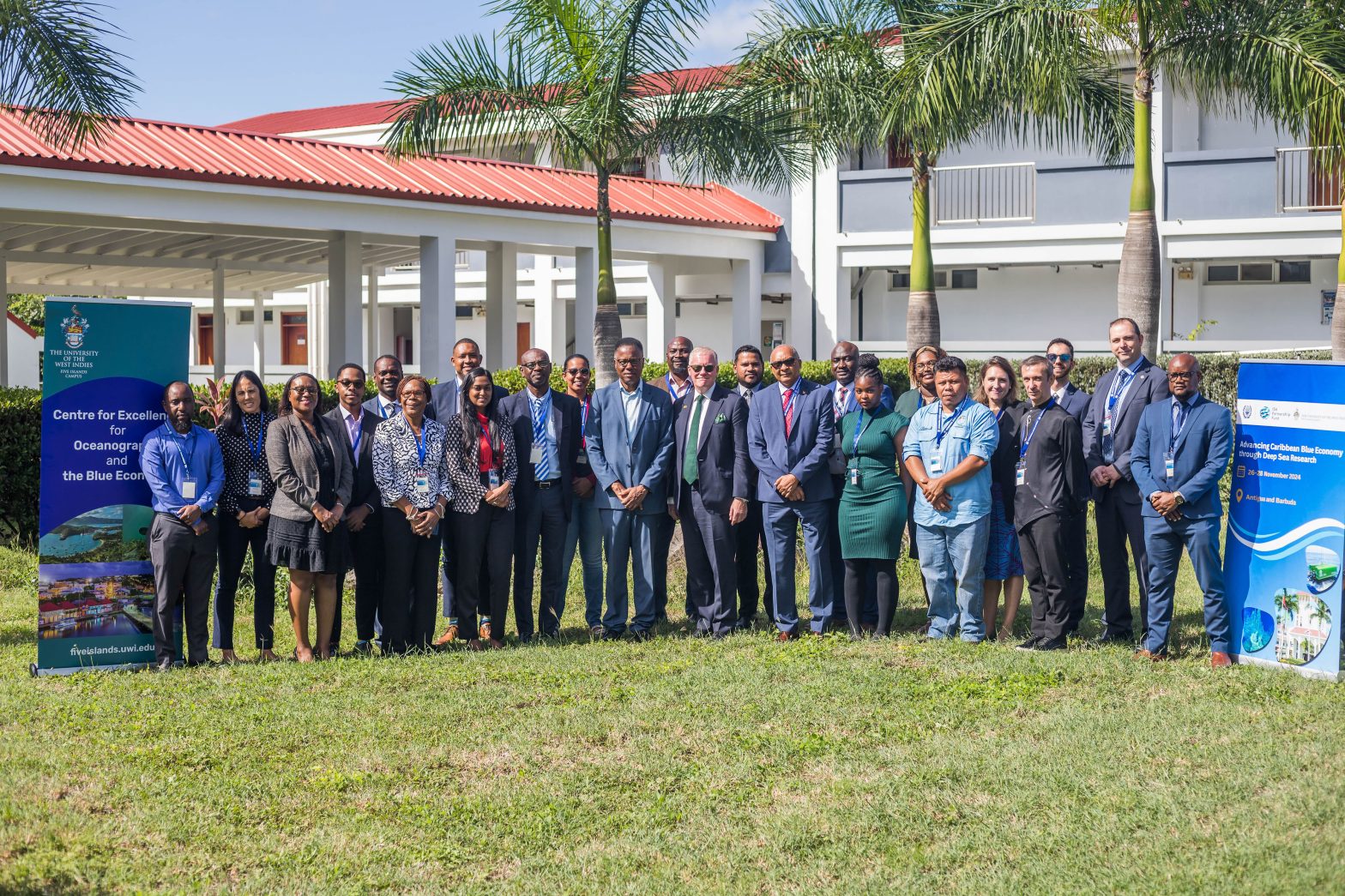St. John’s, Antigua and Barbuda – 28 November 2024 — A landmark workshop, “Advancing Caribbean blue economy through deep-sea research,” concluded today in Antigua and Barbuda showcasing the International Seabed Authority’s (ISA) commitment to strengthening Caribbean Member States’ capacities in the field of deep-sea exploration and marine scientific research in the Area.
Organized jointly by the ISA Secretariat, the Centre of Excellence for Oceanography and the Blue Economy (COBE) of the University of the West Indies (UWI) Five Islands Campus and the Government of Antigua and Barbuda, this three-day workshop brought together international experts from 11 CARICOM Big Ocean States (BOS) to identify the critical capacity needs that need to be addressed to facilitate effective participation in deep-sea exploration and marine scientific research in the Area.
The first activity of the project, “Advancing Caribbean Blue Economy,” received a substantive allocation by the ISA Partnership Fund in January 2024. This international workshop was also the first joint activity carried out by ISA and the COBE under the partnership formalized in May 2024 in the margins of the United Nations Small Island Developing States (SIDS) Conference and alignment with the Antigua and Barbuda Agenda for SIDS (ABAS).
Building upon the achievements and the Action Plan for Marine Scientific Research in support of the UN Decade of Ocean Science for Sustainable Development, a Global Deep-Sea Research Agenda oriented towards key strategic research priorities and the effective integration of developing States in research programmes and technology transfer. ISA is committed to creating the enabling conditions to advance the general knowledge and understanding of the deep-sea environment and its ecosystems. Such an approach continues to inform decision-making processes to guide the development and adoption of the most appropriate measures to ensure that activities in the Area are conducted on the basis of the best available science and the precautionary approach.
Recognizing the unique challenges faced by BOS, ISA has prioritized initiatives that support capacity-building, technology transfer and data sharing in the context of marine scientific research as identified by the Member States themselves.
In this context, the three-day workshop provided the opportunity for participants to discuss and assess national and regional capacity gaps and discuss technological and policy developments that would facilitate the engagement of CARICOM countries in marine scientific research in the Area.
On the last day of the workshop, representatives of CARICOM countries attending endorsed the CARICOM Roadmap in support of capacity development priorities in the context of marine scientific research in the Area (CaribISA Roadmap) set to guide the development and implementation of tailored activities and programmes to strengthen their capacities in this field between 2025 to 2030.
Reflecting on the outcomes of the workshop, the ISA Secretary-General underscored the importance of such an initiative to ensure that all national and regional specificities are fully acknowledged and taken into consideration. “This workshop exemplifies ISA’s commitment to fostering equitable participation in deep-sea activities. Through capacity development and strategic partnerships, we are enabling Caribbean nations to take a leading role in ocean stewardship and innovation. Together, we are charting a path towards a prosperous and sustainable blue economy,” the Secretary-General noted.
H.E. Mr. Dwight Gardiner, Permanent Representative of Antigua and Barbuda to ISA, said, “As we conclude this inaugural workshop, I want to reiterate my gratitude for your participation and contributions. This event marks a significant step forward in our collective endeavour to harness the potential of our vast ocean. Let us seize this opportunity to build upon the knowledge and partnerships forged here, ensuring that the Caribbean region becomes a leader in deep-sea marine scientific research.”
“By actively engaging with the ISA and its programmes, we can secure a sustainable future for our oceans and our people,” Ambassador Gardiner added.
In his concluding remarks, H.E. Mr. Dean Jonas, Ambassador at Large for Blue Economy of the Government of Antigua and Barbuda, emphasized the importance of partnership and cooperation. “As we conclude this gathering, I urge us all to embrace the spirit of collaboration and innovation that has defined this partnership between the ISA and UWI,” he said.
“Let us work together to unlock the vast potential of our oceans, ensuring that they remain a source of life, prosperity and inspiration for generations to come. By investing in sustainable practices, scientific research and human capital, we can build a blue economy that benefits all without compromising the delicate balance of our marine ecosystems. Let us rise to the challenge and shape a future where our oceans thrive and our communities flourish,” Ambassador Jonas added.
Dr. Branson Belle, Executive Director of the COBE at the UWI, Five Islands Campus, noted that “Hosting this workshop represents a major step in continuing the capacity-building activities for our region. It was a pleasure to host both ISA and representatives from various countries here at the COBE located at the UWI Five Islands Campus.”
“We look forward to further engagement with the ISA and are grateful to the ISA Partnership Fund for supporting these activities,” Dr. Belle added.
About ISA
The International Seabed Authority (ISA) is an autonomous intergovernmental organization mandated by the United Nations Convention on the Law of the Sea to manage the mineral resources of the seabed beyond national jurisdiction for the shared benefit of humankind. ISA is committed to the principle that all economic activities in the deep seabed, including deep-seabed mining, must be regulated and responsibly managed using the best available scientific evidence for the benefit of all nations of the world. ISA works to ensure that the voices of all States, including developing States and other stakeholders, are effectively heard in discussions around the sustainable development of the deep seabed.
For media enquiries, please contact:
Mr. Philip Janikowski, Communications Specialist, ISA, pjanikowski@isa.org.jm


